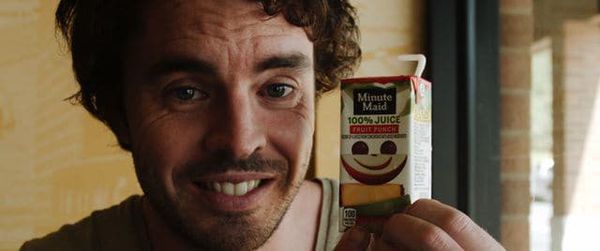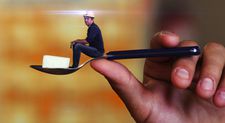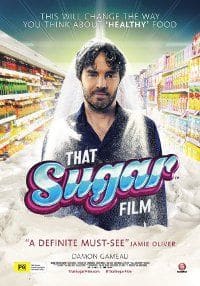 |
| Damon Gameau: 'Right from the beginning, I thought if you're going tell the story of sugar, you have to use all the tricks the food industry use - but subvert them' |
AW: How important was it for you to have a broad audience that included teenagers as well as their parents?
 |
| Damon: 'What we're saying to people is, this is not a diet, it's just about trying to eat real food' |
Obviously, we sometimes had to be more grown up in terms of political aspects but in the edit we ended up condensing all that stuff because I kept thinking of families with kids going to see the film. That's what happened in Australia. We had cinemas full of kids - and people were taking their kids to it. And we became the highest grossing documentary of all time in Australia for that reason.
There are certainly parts of my ego where I wish I hadn't gone as daggy there, but it worked.
AW: Yes, jumping up and down in a pair of yellow Y-fronts... you must have had a moment there?
DG: There were many moments. It's funny because some people get that and understand it and then I've read some reviews where they just don't get that that's who it's aimed at all. What's great is that we've got a study guide for grade five to 11 and about 1000 schools in Australia signed up to it. We're looking to do the same in Britain and America. It's really about getting that generation to change their habits before they ingrain what our generation did. We've got to cut them off at the pass and teach them a different way and that was the whole intention of the film.
 |
| Damon Gameau: 'There are certainly parts of my ego where I wish I hadn't gone as daggy there, but it worked' |
AW: It sounds like you've become quite a man on a mission with this - as though it has snowballed since it finished.
DG: It really has exploded. We finished the film and I thought we would just see what happened. Then we were involved in an initiative called Good Pitch which started out of Britdoc. Basically, you pitch your idea to a room full of philanthropists. And we raised a ridiculous amount of money that allowed us to then take the film much wider than just a cinema room. So we had lots of corporate interest and suddenly there were parliamentary screenings and school screenings and hospital screenings. It's really snowballed in Australia.
AW: So, do you feel like it is having some political heft in Australia?
DG: Yes. Australia has always been quite progressive in terms of health and sugar has been something that's been circulating for the last three years or so, that's kind of why we started it. But it's one of those thing that no one has really put their finger on yet. I think the film is a bit of a catalyst for that. When we started there's no way that people would have shared the trailer or supported the message - they'd have said it was a bit of a fad. But now, because there's such conclusive evidence from a science point of view, because the World Health Organisation has come out and said we should only have six teaspoons a day, a lot of these authoritative bodies have sat up and listened.
Another really important factor for me was that we weren't dogmatic or saying that you have to quit - we're just saying, 'Look, be aware of where it's hidden. Then you can make more informed choices.' If you say to someone, 'Have it in moderation', what does that mean if they don't know it's in low-fat yogurts, in apple juice? You might have one Snickers bar a day and think you're having it in moderation but, the chances are, it's your 40th teaspoon of the day. So that was always the intention. We've battled that, because a lot of people who haven't seen the film have thought it's going to be an anti-sugar, hateful, Michael Moore type documentary - I understand that and there are elements within there that lean towards that but we were always careful to try to be balanced.
AW: It's interesting how you widen it out to look at Moutain Dew in the US - we don't have that drink in Britain.
 |
| Damon Gameau: 'If you can have offer help to someone in some way, it makes you feel good. I'm enjoying that aspect' |
AW: Adults must be grateful that when it comes to drinking, sugar turns to alcohol.
DG: That question has been asked at every Q&A! It says so much about culture - especially in Australia. Some are higher than others but, again, if you have a glass of wine, just don't have the apple juice the same day.
AW: How has it been getting back to normal after eating that diet? How long did it take you?
DG: That was quite a big shock. Once I started editing the film and writing the book I was quite sedentary and just took away all that sugar. But everything reversed in 60 days. The blood tests and probably 90 per cent of the weight came off in that two months. So that's why we decide to put that in, as a hopeful, positive message at the end. And I was back to full strength about a month later. What I never expected was the number of people in Australia who are trying this and having a great result. What we're saying to people is, this is not a diet, it's just about trying to eat real food. We've just been so saturated with marketing and that notion 'eat whatever you want as long as you burn it off', maybe there's a tablet for you. It's just not addressing that root cause and saying to kids, it is vital what you put in your body. I'm not saying don't have a treat but just make sure you're not overdoing that treat.
This is really a story of excess. A little bit of sugar every now and then is not going to hurt you - it's the amount we're having.
AW: You go into an Aboriginal community and look at the situation from their perspective, was that something you intended to do from the start?
DG: I've been an actor for 12 years and my first film was a film called The Tracker by Rolf de Heer. It was with David Gulpilil and when we finished filming, he invited me to come up to his homeland. I was around 24 and I just had this mind-blowing experience of living this really traditional life for two weeks. But they were all drinking coke, giving it to babies and that sort of thing. So when I was making the film, I thought, I wonder if that's still going on because I know that their health markers compared to the rest of Australia are astronomically out of proportion. And the fact that these elders in the film voted to remove coke - what a great story. You go into their heartfelt story and it shows you a reference beyond just my experience.
AW: Have that community found funding for their threatened healthy eating project since the film?
DG: One of the philanthropic things that we do is we've started a foundation, The Mairwiru Sugar Challenge Foundation, so we've already got enough money, we've re-employed John Tregenza, who's in the film and we've started sending up some nutrionists to train up the local people. We've already raised AUD$50,000 just through people seeing the film and donating money. People see it and they care and they want to help.
AW: How hard was it to get access in the States?
 |
| That Sugar Film |
AW: In a way your film is more frightening because everyone knows that eating three fast food meals a day probably isn't good for them - but people do eat a yoghurt for breakfast, fruit juice, a cereal bar in the afternoon.
DG: Yes, the difference is, if I'd been drinking Coke and eating doughnuts yes it would be a very similar film but I'm not touching any of that stuff - and that's the catch.
AW: But you bring it home to people on the day when you eat the sugar cube equivalent of the sugar that's in the food.
DG: Yes, and that night I actually threw up. That was one of the toughest days. I thought this might look crazy, but that's what people are doing! For example, one tablespoon of barbecue sauce has two teaspoons of sugar in it - that's more than there is in chocolate sauce.
AW: Here you are you're an actor whose made a film, what happens now?
DG: We talk about it a lot, not least how did we get to this point? I had no interest in nutrition three years ago. It's snowballed, it's such a beast now that the Facebook page as more than 100,000 followers, there's 300 questions a day from people who have seen the film, asking questions like, 'Can I have honey?'. And it's hard for me to ignore. I want to help them and be there for them but at the same time I want to get on with life with my own family. I'm going to see it out to the end of this year at least and see the release around the world. Then, it'll always be a part of me, but I do have lots of other ideas.
AW: So you want to do more direction?
 |
| That Sugar Film - Poster |
AW: Do you think you might have a go at a fiction film?
DG: I would like to. Obviously, this is my first film and I learnt so much.
AW: And there's a book to go with the film as well?
DG: Yes, That Sugar Book. We also have That Sugar App, which is free. It's great fun, you scan a barcode of a product and the product comes up. You shake your phone and it shows you how much sugar drops out of it. The book really came about because the film's first cut was three hours and 45 minutes because we had so much more politics and history. So this was a reason to condense it into a book. But there's lots of illustration - it's made for families, so parents can show their kids and say, 'Look, this is what it's doing to your brain.' Plus there's tips on sugar intake and recipes. It's more of a companion. People are really fired up by this topic. Often they feel misled because they thought these things were healthy.
That Sugar Film is on release in the UK now. It is released in the US on July 31. For more information, visit the Facebook page
Watch the trailer:





















